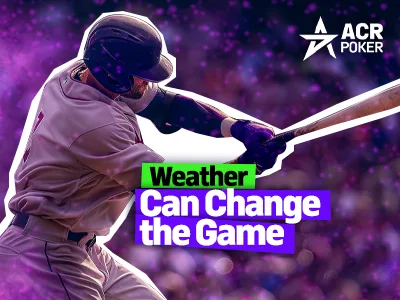Meteorological conditions significantly influence baseball outcomes, creating unique opportunities for astute bettors. The relationship between weather impacts MLB games is particularly pronounced, affecting everything from pitching performance to run production. For those considering underdog wagers, understanding how various weather conditions affect game dynamics can reveal valuable betting opportunities that might be overlooked by the broader market.
Wind Conditions and Their Effect on Game Totals
Wind represents one of the most significant weather impacts MLB games experience, particularly in open-air stadiums. Strong winds blowing outward can turn routine fly balls into home runs, dramatically increasing scoring potential. Conversely, winds blowing inward can suppress offense, benefiting pitchers and defense. Underdogs often present greater value in windy conditions when the expected run environment might neutralize a favorite’s offensive advantage. Bettors who monitor wind forecasts can identify situations where weather might create more balanced competition between teams.
Temperature Influence on Player Performance
Air temperature substantially affects how baseballs travel and how players perform. The weather impacts MLB games through temperature variations that influence ball elasticity and player stamina. Warmer temperatures cause baseballs to travel further, potentially helping offensive teams. Colder conditions typically favor pitchers, as balls don’t carry as well and muscles require more time to warm up. For underdog bettors, understanding these temperature effects helps identify when weather conditions might suppress a favorite’s scoring ability, keeping games closer than expected.
Humidity and Atmospheric Pressure Effects
Less obvious but equally important are the weather impacts MLB games experience through humidity and barometric pressure. High humidity levels can make baseballs heavier and more difficult to hit far, while low humidity in dry climates can create conditions where balls travel further. Atmospheric pressure changes also affect how pitches move and how batted balls carry. These subtle meteorological factors can sometimes tip the balance in close games, particularly affecting power-hitting teams that favorites often rely upon for run production.
Precipitation and Game Delay Scenarios
Rain represents the most direct of weather impacts MLB bettors must consider. Precipitation affects field conditions, pitcher grip, and visibility for batters and fielders. Perhaps more significantly, rain delays can disrupt starting pitchers’ rhythms and force teams into their bullpens earlier than planned. This often benefits underdogs, as deeper bullpens become more valuable when games are shortened or starters are knocked out early. Bettors tracking radar and precipitation forecasts can sometimes find value in underdogs when rain is expected to play a factor.
Ballpark Specific Weather Considerations
The weather impacts MLB games differently depending on stadium architecture and location. Open-air stadiums in Chicago, Boston, and San Francisco experience more significant weather effects than domed stadiums or retractable-roof facilities. Coastal ballparks deal with ocean breezes and fog, while elevation affects ball flight in Denver’s Coors Field. Underdog bettors should develop park-specific weather knowledge, understanding how certain venues respond to particular conditions and which teams are better equipped to handle adverse weather situations.
Strategic Application of Weather Data
Incorporating weather analysis into betting decisions requires more than just checking forecasts. Successful bettors understand how specific weather impacts MLB teams differently based on their construction. Teams built around power hitting might struggle in pitcher-friendly conditions, while contact-hitting teams with speed might maintain offensive production in adverse conditions. The following table outlines how different weather conditions typically affect game dynamics and underdog opportunities.
| Weather Condition | Game Impact | Underdog Consideration |
| Strong Outward Winds | Increased home runs, higher scoring | Reduces pitching advantage for favorites |
| Cold Temperatures | Reduced ball travel, pitcher advantage | Helps underdogs stay in low-scoring games |
| High Humidity | Heavier baseballs, reduced offense | Neutralizes power-hitting favorites |
| Rain/Delays | Bullpen usage, disrupted rhythm | Creates uncertainty that favors underdogs |
Sources for Reliable Weather Information
Accurate weather data is essential for assessing weather impacts MLB games. Bettors should consult multiple sources including National Weather Service forecasts, ballpark-specific weather reports, and hour-by-hour wind and temperature projections. Many advanced betting services provide detailed meteorological analysis specifically for sports bettors, including wind direction changes throughout games and probability of precipitation at first pitch and throughout the contest.
Timing Weather-Based Bets
The timing of weather-influenced wagers requires careful consideration. Lines may move as weather forecasts become more certain closer to game time, particularly for obvious weather impacts MLB games like strong winds or high precipitation probability. Early bettors might get better numbers if they accurately predict weather developments, while those waiting until closer to game time benefit from more certain forecasts but potentially less favorable odds. Developing a consistent approach to timing these weather-influenced wagers helps maintain betting discipline.
Understanding how weather impacts MLB games provides underdog bettors with a analytical edge that many casual bettors overlook. By incorporating meteorological factors into their handicapping process, bettors can identify situations where weather conditions might neutralize favorites’ advantages or create game environments where underdogs can compete more effectively. This weather-aware approach adds another layer of sophistication to baseball betting strategy.

